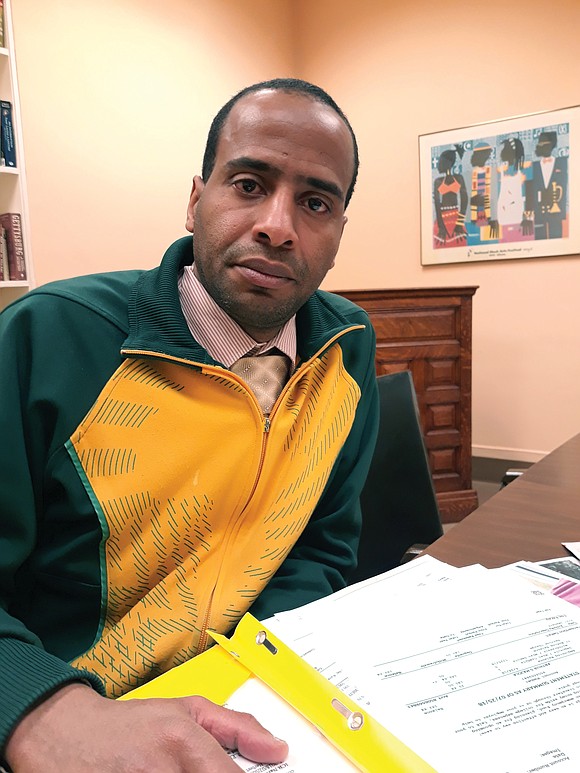Rental car scene blows up to jail time for city man
Jeremy M. Lazarus | 4/12/2019, 6 a.m.
Arthur H. Majola went to pick up a rental car his insurance company was providing after his vehicle, which had been damaged in an accident, went into a repair shop.
But he wound up spending 54 days in jail where he became celebrated for engaging in a hunger strike that nearly killed him but forced his release.
A Richmond businessman who operates three online companies, Mr. Majola was arrested and charged July 3, 2018, with making a bomb threat to the staff of an Enterprise Rent-A-Car outlet on West Broad Street in Henrico County.
A short, slender man, he allegedly made the threat after the staff refused to provide a vehicle when he could not come up with a required $50 deposit using a credit card — a common policy at major rental car companies. All three of his credit cards were declined.
His case, scheduled for a jury trial in Henrico Circuit Court next Tuesday, April 16, is raising questions about the tough state law under which he is charged.
That law makes it a felony to threaten to bomb or blow up a building. As written, the law makes it a crime to utter the words, even if the words are spoken to blow off steam, the person has no ability to make a bomb and if the threat is knowingly false.
The offense, a Class 5 felony for an adult, is punishable by up to 10 years in prison. It is a misdemeanor for a juvenile.
Whether Mr. Majola even made such a threat is uncertain. Cameras inside the rental car office recorded his interaction with the staff and show him calmly talking with the staff and leaving quietly. There is no audio, but the transaction clearly looks ordinary.
Henrico Commonwealth’s Attorney Shannon L. Taylor, who authorized the case, has acknowledged that the recording provides no proof of the threat.
She told the Free Press that the tape shows that neither of the two rental car staff members, both Caucasian, who waited on Mr. Majola appear to feel threatened. Neither recoiled in obvious concern or offered any body language that indicated they felt like they were in jeopardy.
They will be the main witnesses against Mr. Majola in their insistence he issued a bomb threat.
Mr. Majola is adamant the charge is bogus and has turned his life upside down.
“I didn’t make a bomb threat,” Mr. Majola insisted in an interview with the Free Press. “When I talked about blowing up Enterprise and the insurance company, I meant I was going was to sue them and make them pay for putting me through this. I have a little bit of experience with courts. I don’t know anything about explosives. I’m not a violent man, and my record shows that. It’s just a ridiculous charge.”
Whether such testimony will be enough to clear him remains to be seen. Based on the strict language of the law, Ms. Taylor continues to seek a conviction.
However, in other types of crimes, the state Supreme Court has modified tough language in the state criminal code to reflect commonsense experience.
For example, the state’s highest court has long ruled that the use of curse words and foul language is a crime only if the “cursing and abusing” are “fighting words” intended to provoke a fight. Simply uttering foul words is not enough to justify a charge, the court has ruled.
The high court also has ruled that the misdemeanor crime of assault requires a showing of an intent to batter, meaning that the person accused of assault must be shown to intend to hit the person allegedly assaulted.
Mr. Majola has pleaded not guilty and hopes he will not be convicted and slapped with a felony label or a long prison term. Already, he has proven to be a tough customer for jailers.
After his arrest and placement in jail without bond, he immediately began a hunger strike. He refused to eat the Henrico Jail food and mostly avoided water. Within weeks, his health began deteriorating, resulting in Henrico Sheriff Michael Wade sending him to the hospital to recuperate. Mr. Majola ate in the hospital and was returned to jail, where he resumed his hunger strike.
Mr. Majola said he was sent repeatedly to the hospital to prevent his death.
By September, Sheriff Wade called Ms. Taylor for help, telling her that the county had spent $45,000 on Mr. Majola’s care at the jail and hospital. That was the first time she heard about the case.
Ms. Taylor said her office no longer seeks cash bail, leaving it to judges to decide whether any should be imposed. She said she was surprised that Mr. Majola’s public defender had not pushed for bail hearings to have his release reviewed and said she reached out to make that happen.
His attorney, Adam Jurach, could not be reached for comment.
However, Ms. Taylor initially dropped the case when it came up in Henrico General District Court on Sept. 27, ensuring Mr. Majola could go home.
Ms. Taylor, however, then brought the case to the grand jury, which indicted him on the same charge of making a bomb threat.
He was re-arrested Dec. 5. But this time, Ms. Taylor agreed that Mr. Majola could remain free on a personal recognizance bond so he didn’t spend more time in jail before trial. He was freed on his promise to return to court for pretrial hearings and the trial. Before the bond was issued, he threatened to start a new hunger strike if he were to be returned to jail.







